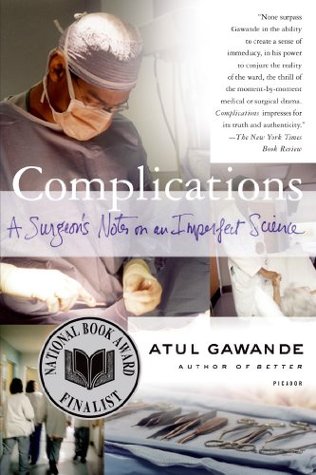More on this book
Community
Kindle Notes & Highlights
Information is inadequate; the science is ambiguous; one’s knowledge and abilities are never perfect. Even with the simplest operation, it cannot be taken for granted that a patient will come through better off—or even alive.
Conscious learning becomes unconscious knowledge, and you cannot say precisely how.
medication mistakes—the single most common type of medical error.
We want progress in medicine to be clear and unequivocal, but of course it rarely is. Every new treatment has gaping unknowns—for both patients and society—and it can be hard to decide what to do about them.
A large review of autopsy studies concluded that in about a third of the misdiagnoses the patients would have been expected to live if proper treatment had been administered.
Regardless of the decade, physicians missed a quarter of fatal infections, a third of heart attacks, and almost two-thirds of pulmonary emboli in their patients who died.
In most cases, it wasn’t technology that failed. Rather, the physicians did not consider the correct diagnosis in the first place. The perfect test or scan may have been available, but the physicians never ordered it.
There is still room enough to get better, to ask questions of even the dead, to learn from knowing when our simple certainties are wrong.
The core predicament of medicine—the thing that makes being a patient so wrenching, being a doctor so difficult, and being a part of a society that pays the bills they run up so vexing—is uncertainty.
As a doctor, you come to find, however, that the struggle in caring for people is more often with what you do not know than
what you do. Medicine’s ground state is uncertainty. And wisdom—for both patients and doctors—is defined by how one copes with it.
In the absence of algorithms and evidence about what to do, you learn in medicine to make decisions by feel. You count on experience and judgment. And it is hard not to be troubled by this.
The mind overestimates vivid dangers, falls into ruts, and manages multiple pieces of data poorly. It is swayed unduly by desire and emotion and even the time of day. It is affected by the order in which information is presented and how problems are framed.
“The plain fact is,” he wrote, “that many decisions made by physicians appear to be arbitrary—highly variable, with no obvious explanation. The very disturbing implication is that this arbitrariness represents, for at least some patients, suboptimal or even harmful care.”
The possibilities and probabilities are all we have to work with in medicine, though. What we are drawn to in this imperfect science, what we in fact covet in our way, is the alterable moment—the fragile but crystalline opportunity for one’s know-how, ability, or just


